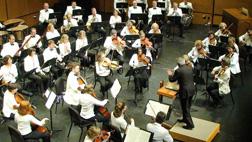Over heard at the Peninsula Music Festival or Why Play New Music?
- Share
- Tweet
- Pin
- Share

On Saturday, August 7, the Peninsula Music Festival concert featured a piece of music composed in 2004 by the young (32 years old) Swedish composer, Tobias Brostrom. Brostrom is a percussionist, so naturally his compositions feature the percussionist as the soloist. The concert also included a piece called “Fratres” by the Estonian composer Arvo Part, and it closed with “Symphony No. 2” by Jean Sibelius. A program filled with 20th century composers, two of whom are still living.
To those who attend the Peninsula Music Festival regularly, this is not unusual, but this has been a year of first-time attendees who may not be familiar with the long tradition of new works and attention to living composers that has been part of the festival’s programming since its inception.
This became obvious when, at the end of the concert, I heard a woman say, “This orchestra must not need any money if they program a concert like that.” Now please understand, this woman loved the concert. She was making an observation about programming and orchestras that has become the norm. She and her friend went on to discuss how the current economy has caused many orchestras around the country to adapt their programming to more “popular” classical music or as we in the industry refer to them, “the war-horses.” The hope being that in doing so, you will attract more ticket buyers at a time when people are not spending money on entertainment and especially not classical music.
I am sure all of you reading this know, whether you attend the Peninsula Music Festival or not, we need money. The festival is no different than any other business. We have rent, phones, internet, printing, advertising as well as all of those musicians that it takes to present the symphonic repertoire. Yet, the woman who made the comment is not all wrong. Why would the festival continue to take such a risk in a shaky economy? Two 20th century works and one 21st century work on one concert is not going to sell out. Add to that the fact that we commissioned a piano concerto to be written for the Peninsula Music Festival by pianist Stewart Goodyear and many in the symphony industry may assume that our board has gone crazy. I prefer to see them as innovators.
With the change in the economy, many business decisions have been made from fear. Orchestras all over the country are cutting their budgets, playing less concerts, and programming music that they think will ‘sell.’ Yet, no one is reporting record ticket sales and the deficits continue to grow while the endowments (and ticket buyers) decline.
The board of the Peninsula Music Festival made programming decisions based on our mission, our 58 years of success, the loyal audience and a need to continue to grow as an organization. There are important composers of the late-20th and early-21st century who must be heard. This “new” music will become familiar. I remember years ago when the festival first performed a piece by the American composer John Adams. At the time, it was a radical programming decision. Today, Adams is a mainstream composer. People have heard his music, become familiar with his style, and buy tickets to concerts that feature his compositions.
I recently read an article that appeared in Symphony Magazine by Greg Sandow on the problem of new music. This quote struck me as I read through it: “…classical music, at least in America, is a cultural backwater. We know how to preserve the past; sometimes we can even bring it alive. But in the contemporary world, we barely exist. We create new works, but no large group of people (either inside our field or outside) knows much about them, or even cares.”
By programming new or newer music, people begin to know and to care. The festival has also seen that newer music draws a new audience. In a time when our audience is dying off, contemporary music attracts a younger audience and a much needed new audience. Younger people are not our audiences of tomorrow, they are our audience of today, and we reach them though innovative programming that challenges, excites, and educates.
The musicians of the orchestra also desire to play new music. They too want to be challenged and excited by their work. Though difficult to learn and often a real challenge on our short rehearsal time, it is the innovative programming from Maestro Yampolsky that keeps many of these world class musicians returning year after year to the Door Peninsula.
Yes, we need money, and yes, we need to sell tickets; but the board of directors of the Peninsula Music Festival knows that for a business to thrive, grow, and move forward, they must continue to be innovative. An orchestra’s innovation comes through programming.
I can guarantee that the August 2011 will also be filled with explosive, exciting and innovative programming that will explore music of yesterday, today, and the familiar of tomorrow.
Sharon Grutzmacher has been executive director of the Peninsula Music Festival for 19 years.
Peninsula Arts and Humanities Alliance, Inc., is a coalition of non-profit organizations whose purpose is to enhance, promote and advocate the arts, humanities and natural sciences in Door County.
More Innovative Programming to Come
Make plans to join the Peninsula Music Festival for their 59th Season (August 2 – 20, 2011) and 60th Season (August 7 – 25, 2012).
The Peninsula Music Festival performs nine different concerts in three weeks at the Door Community Auditorium in Fish Creek.
Keep an eye on upcoming programming at the Festival’s website, http://www.musicfestival.com

